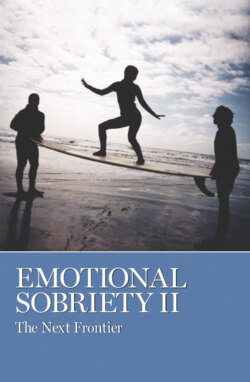Читать книгу Emotional Sobriety II - Группа авторов - Страница 12
На сайте Литреса книга снята с продажи.
It's Not the Shoelace
ОглавлениеMay 2010
Recently, my home group conducted a workshop exploring emotional sobriety. We broke it up into different aspects such as “What is emotional sobriety?”, “How does it differ from physical sobriety?”, etc. My assignment was to explore why we need emotional sobriety and I presented it as follows:
When I first came to AA my emotions rose to the surface, where I became aware of them. While I thought that I had successfully submerged them with alcohol when I was drinking, I can't deny that I often drank at “him,” “her,” “Mom,” "Dad,” the boss, some unfair customer, a disrespectful sales clerk, the police, the system, or whatever. I could say that alcohol let me not feel, but the truth is that I felt everything and often wanted to show "them.”
I used drinking to hurt others or plot my revenge. The only blessing was that I often wouldn't even remember the plot when I sobered up. Newly sober, I not only had the feelings but I also had a lack of ability to deal with them. My immaturity came out in full force. My old idea was that alcohol would still work with these feelings, and I would sometimes give in. Even if I didn't drink, I could be miserable and hold grudges. That's when something trivial like a broken shoelace might lead me to drink because it was the last straw.
Without the help of God and a sponsor, I might never know that it wasn't the shoelace but the lingering grudge and my lack of emotional sobriety that led to drinking again. While this lack of emotional sobriety was dangerous when I was newly sober, the danger did not go away just because I've achieved some time in AA. Indeed, I can mistake number of years for a degree of emotional sobriety. I can rest on my laurels without even recognizing it.
When I hold on to resentments, when I find things unforgivable, when I am jealous of another's success, when I am unwilling to listen to others and change my mind, when I react severely to criticism even as I congratulate myself for another day or month or year of not drinking, I am not only not emotionally sober, but I also may become not physically sober. This can happen even if I once had a spiritual awakening and have many years of sobriety behind me. The Tenth Step tells me to "watch for selfishness, dishonesty, resentment, and fear" not because these emotions are so deadly in themselves, but because they block me from dealing in a mature, emotionally sober way, rather than just reacting. Since the essay on the Step next says, “and when they crop up,” it is a sure bet that time in the program will not make me immune from these negative emotions and my ensuing reactions. My reactions can include drinking again, but even if I don't drink, I can cause problems and heartache in the lives of those who love me and work with me.
As the book says, “We believe a man who says sobriety is enough is unthinking.” For the sake of others if not for myself, I should seek emotional sobriety.
When I am letting myself be ruled by “selfishness, dishonesty, resentment, and fear,” any rational thinking or action I do would be purely by accident. Likewise, serenity would be elusive at best and non-existent at worst. As a friend says, my biggest job in a spiritual life is to become undisturbed. I would only have one of two reactions to any negative interaction with another person: I would either forgive the other person or make amends.
I have made a real advance in emotional sobriety if I finally realize I do not have to react to a slight by striking back.
Finally, I was told to live a day at a time but not told how to do that. I submit that it is impossible to do a day at a time when bedeviled by emotional chaos. If I strive for emotional sobriety, I will have a much better chance of living in the now, which can lead to joy and appreciation for the wonder of my life.
Jim H.
Largo, Florida
